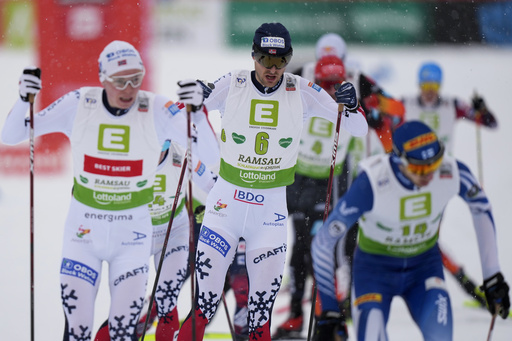Nordic combined has a storied past in the Olympic arena but faces uncertainty regarding its future. This event has been part of the Winter Olympics since they began in 1924, showcasing athletes’ skills in both ski jumping and cross-country skiing. However, with the looming 2026 Winter Games in Milan-Cortina, there are concerns that it may not survive as an Olympic sport.
“The future of Nordic combined is a significant topic of discussion among us,” remarked Joergen Graabak, a four-time Olympic champion from Norway, in a recent interview. The International Olympic Committee (IOC) is set to make decisions in June about which events will feature in the upcoming 2030 Winter Games in the French Alps, and Nordic combined is on shaky ground due to its gender disparity. The sport noteworthy is unique in that it currently allows only men to compete at the Olympic level, thus leaving women without the chance to pursue medals in this discipline. The International Ski and Snowboard Federation (FIS) plans to seek inclusion for women’s Nordic Combined but will not do so until summer 2026.
As the IOC promotes the 2026 Games as the most gender-diverse in history—with 47% of competitors being female—it faces a critical choice. It could decide to support the inclusion of women in Nordic combined, or it could choose to cut the sport entirely. In light of these uncertainties, stakeholders including FIS, national bodies, athletes, and advocates are actively working to ensure Nordic combined remains a part of the Olympic program. This includes efforts to increase the number of athletes participating and to raise visibility through initiatives like the docuseries “The Overlooked” and enhanced social media presence.
In an effort to support the sport, the French ski federation has joined forces with FIS to advocate for the introduction of a women’s Nordic combined event by the time the Olympics return to France in 2030. Pierre Mignerey, the technical director of the French skiing federation, emphasized the importance of inclusion, stating, “It is only logical that women should have the chance to compete as well.” However, he acknowledged that they do not possess the final authority in the decision-making process.
Jarl Magnus Riiber, a five-time World Cup champion currently holding the number one ranking, expressed concern about the potential consequences of eliminating Nordic combined, suggesting it would negatively impact both ski jumping and cross-country skiing. Riiber believes it is crucial to maintain the sport for the stability of the wider competitive ecosystem. “While it may seem a straightforward solution to drop Nordic combined, I think maintaining it would be more beneficial for the future of Winter sports,” he stated.
In the last three years, Nordic combined has narrowly avoided expulsion from the Olympic lineup. The IOC executive board previously noted the sport’s lack of international representation beyond Europe, with only four countries winning medals in the past three Olympic Games. Nonetheless, efforts have been made to improve the situation, with FIS providing regular updates and meetings. Female athletes have also made strides in the sport, with 46 women earning World Cup points ahead of the upcoming championships in Norway—up from just 30 in the inaugural women’s season four years ago.
With top skiers from countries like Germany, Japan, and Norway competing at high levels, and with the U.S. showcasing emerging talent through Alexa Brabec and Annika Malacinski, the rallying call for women’s inclusion grows stronger. Recently, Brabec achieved a notable fourth-place finish in Austria, marking the best result for an American woman since Tara Geraghty-Moats won a World Cup event in 2020, although Geraghty-Moats has since moved on to biathlon. At just 20 years of age, Brabec remains hopeful about competing for Olympic glory in France in five years. “It would be a real shame to keep us out,” she expressed, adding that it is encouraging to see support from the French for the inclusion of women.
With passionate athletes advocating for change, the fate of Nordic combined will soon be determined as key decisions approach. The struggle for equality and representation in this unique sport continues, revealing the enduring spirit of its athletes and supporters.


